Honors physics - Study guides, Class notes & Summaries
Looking for the best study guides, study notes and summaries about Honors physics? On this page you'll find 82 study documents about Honors physics.
All 82 results
Sort by
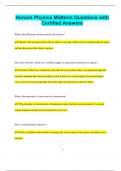
-
Honors Physics Midterm Questions with Certified Answers
- Exam (elaborations) • 17 pages • 2024
-
- $9.99
- + learn more
Honors Physics Midterm Questions with Certified Answers What is the difference between speed and velocity? Speed is the measure of how fast an object is moving, while velocity includes both the speed and the direction of the object's motion. How does Newton's Third Law of Motion apply to interactions between two objects? Newton's Third Law of Motion states that for every action, there is an equal and opposite reaction, meaning that when one object exerts a force on a second obj...
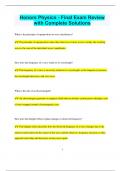
-
Honors Physics - Final Exam Review with Complete Solutions
- Exam (elaborations) • 15 pages • 2024
-
- $9.99
- + learn more
Honors Physics - Final Exam Review with Complete Solutions What is the principle of superposition in wave interference? The principle of superposition states that when two or more waves overlap, the resulting wave is the sum of the individual waves' amplitudes. How does the frequency of a wave relate to its wavelength? The frequency of a wave is inversely related to its wavelength; as the frequency increases, the wavelength decreases, and vice versa. What is the role of an ele...
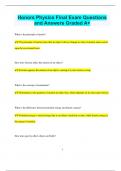
-
Honors Physics Final Exam Questions and Answers Graded A+
- Exam (elaborations) • 14 pages • 2024
-
- $9.99
- + learn more
Honors Physics Final Exam Questions and Answers Graded A+ What is the principle of inertia? The principle of inertia states that an object will not change its state of motion unless acted upon by an external force. How does friction affect the motion of an object? Friction opposes the motion of an object, causing it to slow down or stop. What is the concept of momentum? Momentum is the quantity of motion an object has, which depends on its mass and velocity. What is the dif...
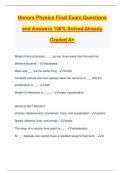
-
Honors Physics Final Exam Questions and Answers 100% Solved Already Graded A+
- Exam (elaborations) • 7 pages • 2024
-
- $8.99
- + learn more
Honors Physics Final Exam Questions and Answers 100% Solved Already Graded A+ Weight (force of gravity) ____ as you move away from the earth by distance squared. - decreases Mass and ___ are the same thing - inertia Constant velocity and zero velocity mean the net force is ___ and the acceleration is __. - zero Weight (in Newtons) is _____ - mass x acceleration MASS IS NOT WEIGHT Velocity, displacement, momentum, force, and acceleration - vectors Speed, distance, time, and energy - sc...
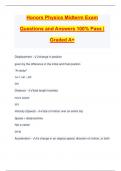
-
Honors Physics Midterm Exam Questions and Answers 100% Pass | Graded A+
- Exam (elaborations) • 10 pages • 2024
-
- $9.49
- + learn more
Honors Physics Midterm Exam Questions and Answers 100% Pass | Graded A+ Displacement - change in position given by the difference in the initial and final position *A vector* ∆x = ∆xi - ∆xf (m) Distance - total length traveled not a vector (m) Velocity (Speed) - rate of motion over an entire trip Speed = distance/time Not a vector (m/s) Acceleration - a change in an objects speed, direction of motion, or both
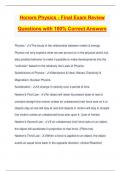
-
Honors Physics - Final Exam Review Questions with 100% Correct Answers
- Exam (elaborations) • 10 pages • 2024
-
- $9.49
- + learn more
Honors Physics - Final Exam Review Questions with 100% Correct Answers Physics - The study of the relationship between matter & energy. Physics not only explains what we see around us in the physical world, but also predicts behavior to make it possible to make developments into the "unknown" based on the relatively few Laws of Physics. Subdivisions of Physics - Mechanics & Heat, Waves, Electricity & Magnetism, Nuclear Physics Acceleration - A change in velocity over a period of time ...
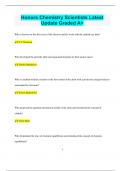
-
Honors Chemistry Scientists Latest Update Graded A+
- Exam (elaborations) • 10 pages • 2024
- Available in package deal
-
- $9.99
- + learn more
Honors Chemistry Scientists Latest Update Graded A+ Who is known for the discovery of the electron and his work with the cathode ray tube? J.J. Thomson Who developed the periodic table and organized elements by their atomic mass? Dmitri Mendeleev Who is credited with the creation of the first model of the atom with a positively charged nucleus surrounded by electrons? Ernest Rutherford Who proposed the quantum mechanical model of the atom and introduced the concept of orbi...
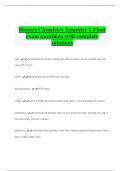
-
CHEMISTRY CUMULATIVE BUNDLED EXAMS QUESTIONS WITH COMPLETE SOLUTIONS
- Package deal • 31 items • 2024
-
- $36.49
- + learn more
Honors Chemistry Semester 1 Final exam questions with complete solutions 2 Exam (elaborations) General chemistry 1 cumulative final exam questions and answers 3 Exam (elaborations) Cumulative Exam- Chemistry Exam Questions With Complete Solutions 4 Exam (elaborations) Cumulative Exam Review Integrated Physics and Chemistry B questions with compl
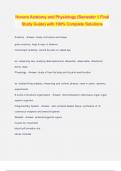
-
Honors Anatomy and Physiology (Semester 1 Final Study Guide) with 100% Complete Solutions
- Exam (elaborations) • 24 pages • 2024
- Available in package deal
-
- $12.49
- + learn more
Honors Anatomy and Physiology (Semester 1 Final Study Guide) with 100% Complete Solutions Anatomy - Answer- study of structure and shape gross anatomy: large & easy to observe microscopic anatomy: cannot be seen w/ naked eye ex: measuring size, studying dead specimens, dissection, observation, directional terms, static Physiology - Answer- study of how the body and its parts work/function ex: studied living subjects, measuring acid content, physics, heart in action, dynamic, experiments...
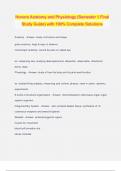
-
Honors Anatomy and Physiology (Semester 1 Final Study Guide) with 100% Complete Solutions
- Exam (elaborations) • 24 pages • 2024
-
- $13.49
- + learn more
Honors Anatomy and Physiology (Semester 1 Final Study Guide) with 100% Complete Solutions Anatomy - Answer- study of structure and shape gross anatomy: large & easy to observe microscopic anatomy: cannot be seen w/ naked eye ex: measuring size, studying dead specimens, dissection, observation, directional terms, static Physiology - Answer- study of how the body and its parts work/function ex: studied living subjects, measuring acid content, physics, heart in action, dynamic, experiments...

How did he do that? By selling his study resources on Stuvia. Try it yourself! Discover all about earning on Stuvia


